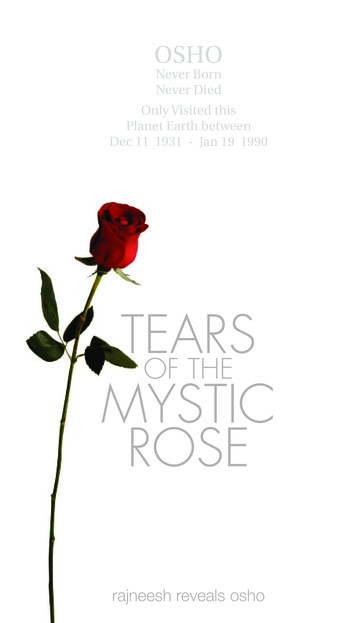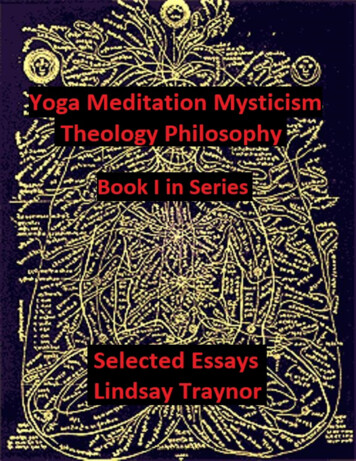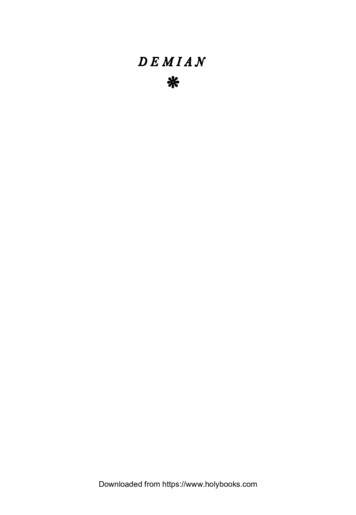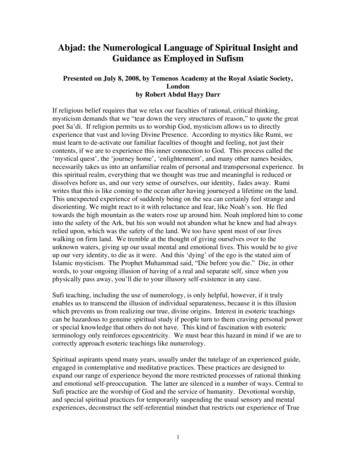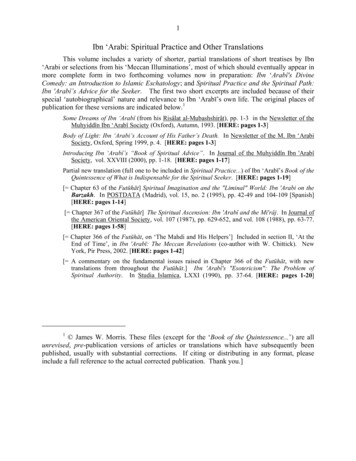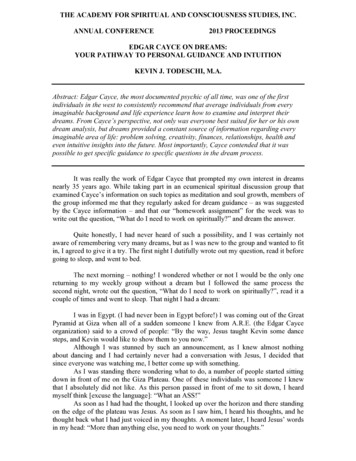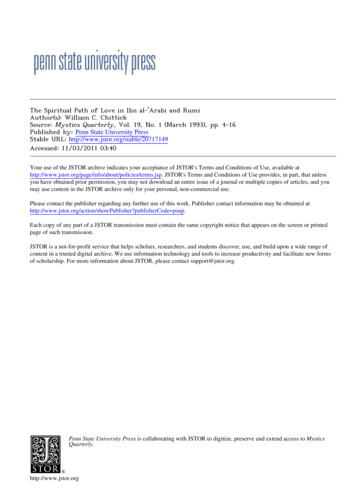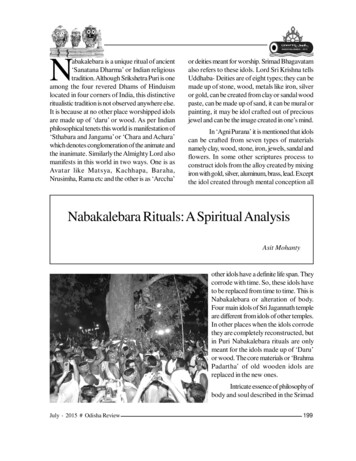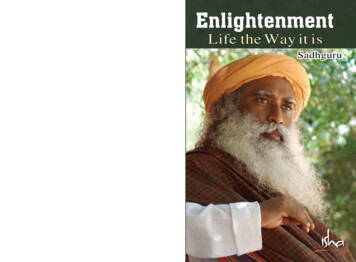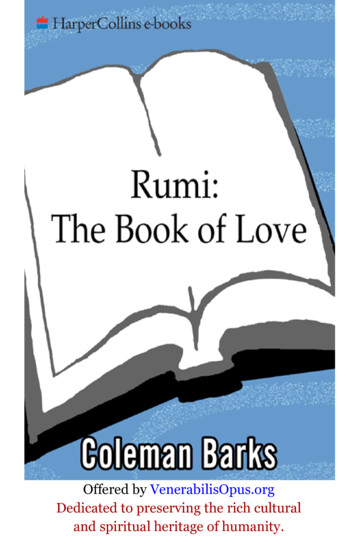
Transcription
Offered by VenerabilisOpus.orgDedicated to preserving the rich culturaland spiritual heritage of humanity.
Translations and Commentary byColeman Barkswith John Moyne, Nevit Ergin,A. J. Arberry, Reynold Nicholson,and M. G. GuptaRumiRumRumithe Bookof LovePoems of Ecstasy and Longing
for Judith Orloff
ContentsPrefaceIntroduction: The Magnificent Regions of the HeartA Brief Account of Rumi’s Life1. Spontaneous Wanderingxixviixxi1Excuse my wandering . . .Five ThingsThe Many WinesCooked HeadsWhere You Love FromYou’ve so distracted me . . .In your light I learn how to love . . .Drumsound rises on the air . . .Are you jealous of the ocean’s generosity? . . .There’s Nothing Ahead2. Sohbet: Who You Talking To?Response to Your QuestionIf you want what visible reality can give . . .Special PlatesYou Are Not Your EyesWhat Was Said to the RoseThe MusicImra’u ‘l-Qays334667788810121313141515163. The Superabundance of Ordinary Being18ZuleikhaPut This Design in Your CarpetThe Road HomeThis Is Enough19202122iii
UzayrOut of nowhere a horse . . .Amazed MouthBirdsong, wind . . .Begin4. Sudden Wholeness222323242425This MarketThe Music We AreWalnutsYou that come to birth and bring the mysteries . . .No Better GiftThis moment this love comes to rest in me . . .The clear bead at the center changes everything . . .A thousand half-loves . . .PatternAuction5. Escaping into Silence2626272929303030303132QuietnessSome Kiss We WantThe WaterwheelBlessing the MarriageTwo Days of SilenceI hear nothing in my ear but your voice . . .Which is worth more, a crowd of thousands . . .Passage into Silence6. A New Life333334353536363738Escaping to the ForestLove comes sailing through, and I scream . . .Any Chance MeetingNasuh’s ChangingIf you love love . . .What I say makes me drunk . . .The Circle7. Grief4141424242434345The Death of SaladinBirdwingsThe Silent Articulation of a Faceiv464747
The Allure of LoveSky-CirclesI Throw It All AwayYour FaceI’ve broken through to longing now . . .The center leads to love . . .My work is to carry this love . . .Pale sunlight . . .The Purpose of EmotionThe ground’s generosity takes in our compost . . .8. Tavern Madness4949505051515151525253I am a glass of wine with dark sediment . . .SmokeI’m Not Saying This RightWho Says Words with my Mouth?We have a huge barrel of wine, but no cups . . .Real value comes with madness . . .A Cap to Wear in Both WorldsMidnight, but your forehead . . .There’s a strange frenzy in my head . . .FringeDrunks fear the police . . .The Ache and ConfusionLet the lover be disgraceful, crazy . . .Wonder Without Willpower9. Absence555556565757585858595960606062Like Light Over This PlainCandlelight Becomes MothThe Basket of Fresh BreadWhen you are with everyone but me . . .This Torture10. Animal Energies646565676869Think that you’re gliding out from the face ofa cliff . . .The Public BathMashallahSpirit and BodyBreadmakingv7373747575
Sexual Urgency and True VirilityTwo Ways of Running11. Love’s Secret788386Close to Being TrueWhat Hurts the Soul?Love is the way messengers . . .Hidden InsideIf everyone could see what love is . . .They try to say what you are, spiritual or sexual . . .Come to the orchard in spring . . .12. Love’s Discipline8888898990919192Who Makes These Changes?DrowningThe Dog ProblemZikrThe Core of MasculinityClear BeingThe Soul’s FriendLongingThe morning wind spreads its fresh smell . . .What Draws You?FearA Teacher’s PayLooking into the CreekThe Polisher13. Shift from Romance to FriendshipBurnt KabobSitting in the OrchardThe Prince of KabulThe WristIf the beloved is everywhere . . .The King, the Handmaiden, and the DoctorReason has no way to say . . .14. 112112117118The Sunrise RubyThe Generations I Praise120121vi
One Swaying BeingHeld like this, to draw in milk . . .Hangover RemorseSoul, Heart, and Body One MorningToday, like every other day, we wake up empty . . .Out beyond ideas of wrongdoing and rightdoing . . .15. Die Before You Die121122122123123123124Judge a moth by the beauty of its candle . . .HusamLovers are alive to the extent . . .That QuickEmpty BoatIn the slaughterhouse of love they kill only . . .I Trust YouImadu’l-MulkYou have said what you are . . .Some nights stay up till dawn . . .16. Harsh i’s MarriageHarsh EvidenceThe Stupid Things I’ve DoneCandle at NoonDervishesDovesWhen Words Are Tinged with LyingThere You AreA night full of talking that hurts . . .There’s a shredding that’s really a healing . . .Dance, when you’re broken open . . .All I know of spirit . . .Your Defects17. Meditation les About RestraintThe Company of LoversThe Look That OpensStraw and GrassesFriend, our closeness is this . . .vii142142143143144
18. Love Dogs145The Ocean SurgeLove DogsInside water, a waterwheel turns . . .No better love than love with no object . . .A Great WagonBlasphemy and the CoreYou’re song . . .Keep walking, though there’s no place to get to . . .19. One Stroke Down145146147147147148149149150Lightning, your presence . . .I can break off from anyone . . .The Friend comes into my body . . .Wooden CagesMore RangeAyaz and the King’s PearlHallaj20. Love’s Excess151151151152153153156157The Source of JoyRoses UnderfootPoetryBirdsong from Inside the EggEastern MysteryNo Flag21. Love’s Bewilderment159160161161162163164God only knows, I don’t . . .I reach for a piece of wood. It turns into a lute . . .In complete control, pretending control . . .Moses and the ShepherdThe minute I heard my first love story . . .Morning WindThe Ocean’s MotionIgnorance22. Lord of the Heart165165165166169170170171173I am so small I can barely be seen . . .EyesI am filled with you . . .viii174175175
When you feel your lips becoming infinite . . .The GranaryThe Gazing-HouseThe Guest HouseThe One Thing You Must DoThis We Have NowA Note on TranslationNotesIndex of Titles and First Lines176176178179181182183185195About the AuthorCreditsCoverCopyrightAbout the Publisherix
PrefaceI have sold too many books. Rumi translations have nobusiness cresting in a wave of over half a million. It’s likeselling picnic tickets to an unmarked minefield. Youwouldn’t expect there to be a rush, but somehow there is. Imay have left out something big and basic, like lowercaseislam (submission). This love poetry is meant to obliterateyou lovers. Rumi wants us to surrender. I bow to the grandeurof his full prostration. I never want to diminish that. This isnot Norman Vincent Peale urging cheerfulness, conventional morality, and soft-focus, white-light feel-good, nor isthis New Age tantric energy exchange. This is giving yourlife to the one within that you know as Lord, which is atotally private matter. No one except you can judge howthat is going. But if you’re not doing it, Rumi says, you arewasting your time here. Where’s the solace of that statement? I once told a greeting card company that wanted toput Rumi verses on a card, “Rumi’s poetry wants to dissolvethe lovers. Annihilation is the point.” There was a longsilence on the other end. “Is there a holiday?”Maybe we’re ripe for Rumi’s knowing, his way of love. Ihope so. I take great delight in meeting bright twelve-yearolds who love certain Rumi poems, such as “The GuestHouse.” They know the media and their community havelied to them about love, with all the fake love stories. Theyhear Rumi trying to tell them some truth about love, andthey appreciate it. Maybe it’s time to hear about going-in,about the joy of the witness in love, in meditation, inxi
dreams, time to meet the one who looks into the creek.Maybe we long now for the silence he loves. Say we’retiny blind cavefish swimming a gorgeous dark. We love themountain the cave is inside, and somehow we love the sun,even though we haven’t seen it and maybe never will. That’sthe love these poems sing, so how come they’re wildlypopular? I don’t know.In Marina del Rey, a posh southern California beachcommunity, there’s a side of a building painted shades ofblue, on the left where Washington meets the beach. It hasa Rumi quote high up in the right-hand corner. The groundfloors of the beachside condos are garages stacked withCorvettes and Lexi and Jaguars, mostly shiny black, Bentleys, old BMW convertibles, fancy Lincoln off-road vehicles, and custom cars with no brand name. Upstairs amongthe Chinese objets and the Edwardian sideboards and theMotherwells, more often than not you will find on thethick glass, stylishly low, bedside table a well-read copy ofThe Essential Rumi.A creative writing teacher on the prime-time showJudging Amy holds up two books, The Great Gatsby and TheEssential Rumi, “Read these and learn how to write.” AlecBaldwin has the book briefly in his hand in a movie whosetitle I can’t recall. That book has achieved the cultural status of an empty Diet Coke can! It’s everywhere. It’s recommended summer reading in a two-page newsletter put outby a women’s clothing store, Kathleen Sommers of SanAntonio.Philip Glass goes on world tour with Monsters of Grace, achoral piece using Rumi’s words. Donna Karan reads Rumion the fashion runway showing her new line. Madonna andDemi Moore read his poems on a Deepak CD. What tomake of Rumi-mania? This too shall pass? Of course it will.For the first twenty years of the last century, I have heard,the most read book of poetry was Fitzgerald’s Rubaiyat ofxii
Omar Khayyam, far and away. No one reads that much nowbut graduate students.I remember standing in the Intimate Bookstore inChapel Hill in the late 1950s reading Walter Bennett’s ThisIs My Beloved, a gift book of love poetry that every now andthen mentions pubic hair, as I recall. There were otherlightweights in the same area. I thought of them as bookspeople bought and gave each other but never actually read.The packaging implied something sweet and romanticinside. There were Japanese haiku collections and veryskinny pastel Emily Dickinsons on that shelf too, which isa violation of the Truth in Labeling Act. She and Basho arenot easy company. Rod McKuen was nearby. The poetrycommunity, with good reason, sees popularity as suspect.Billy Collins is having to fight that, a little. Maya Angelouhas signed on with Hallmark.But Idylls of the King my foot, I am more serious aboutliving, and was even in the 1950s. I never bought booksfrom the candy shelf. I gave my sexy Russian-Jewish college sweetheart a big collection of e. e. cummings. In theslipshod mucus etcetera, we were undergraduates who started amagazine whose first issue got banned by the HonorCouncil, and I had published a very strange Wolfean shortstory in the Carolina Quarterly. In my button-down I wasdeep into Colin Wilson and the mystics mentioned in TheOutsider. Hesse, Boehme, Eckhart. I had Evelyn Underhill’sMysticism by my garret bed, and I told people I wanted toteach a course in mysticism. There were no mysticismcourses at any college I ever went to, Berkeley and NorthCarolina.Let’s say there are two shelves, one with the true mystics and at the front of the store, the fad love-books. I wantthis on the former, please. Jelaluddin Rumi and ShamsiTabriz are real. They gave the human condition one of thebest shots it’s been given. Rumi’s poetry records thatxiii
Friendship, and that accounts for its wide appeal. Forgetthe movie stars. I met a guy behind the counter at WestBuilding Supply in Athens, Georgia, who asked deep questions about the Delicious Laughter collection. “What’s thiswith Eyes Shut Facing Eyes Wide Open?” Sit down withhim. It may be this book will make it to the front of thestore for Valentine’s, but it’s too rebellious to be there. Itwill not really behave itself anywhere in the store, not onthe Islamic shelf, not in the poetry section, althoughmaybe with the cookbooks. It likes cookbooks.Alice Munro has a collection of stories called Hateship,Friendship, Courtship, Loveship, Marriage. I’ve not read it, but Imight. I like to watch the changing moods and nuances offalling in and out of love, and so does Rumi. He’s not somemystic snob. He sees the beauty and importance of anything human beings do, no matter how scandalous or violent. The slipping and sliding around sex, the posturing ofcombatants prior to combat. But he always uses humanincident as a lens to look into soul growth. The idea of commitment, that staple of psychology, doesn’t come up, nor anyfear of intimacy scolding, no shoulds and oughts.It doesn’t matter that you’ve broken your vowa thousand times. Still come,and yet again, come.Rumi was an enlightened lover, a true human being,realized, whatever you want to call those who get to bedeeply themselves. I had a dream once where I felt thegrace of a continuing connection with my teacher, BawaMuhaiyaddeen, who told me to do this Rumi work. Bawawas also a true human being. The transmission from him inme was, in the dream, visible in my eyes and also apparentin the currency, the popularity, of Rumi’s poetry. My advicewith this book, then, is to try, as he says, to listen for thexiv
presences inside poems. Connect there with an open heart, andfollow the oceanfrog if he starts for home.1I have been lucky (I guess) not to have to write for aliving. I taught school, and now the retirement and thesocial security are enough. That’s not to say I don’t cash theRumi royalty checks and go on NPR to talk about poetry. Ido. But the fame and fortune numbers don’t motivate me. Iwait for the next poem. That keeps me going, what RobertBly calls the honey of words. The taste and the taste again.Though that sounds a little too pure. I want recognitionand reward as much as anyone.And to be absolutely clear, neither this book nor its titlewas my idea. My editors at Harper San Francisco, and myagent, suggested the project. But as I’ve gotten into puttingit together, I have made the book mine, perhaps to theirchagrin. I’m not positive, but I’ll bet they expected more ofa lean toward flowers than toward annihilation. There areflowers here certainly. The sweetness in much of Rumi isundeniable. Anyway, your editorial instincts were right, andI’m very grateful, Steve, Kris, John, Eric, Kathi, Reid.I once calculated that Rumi books sell at least a hundred a day right through weekends and holidays, while myown writing goes at about twelve copies a month, worldwide. Those numbers keep me humble. I am just about thehumblest person one could ever meet. And I do look at thedotcom numbers. Maybe it’s true to say that this writing isfor fortune and fame as well as the pouring forth of visionand revision. Oh, what is so tiresome and fatuous as a mystic poet talking sales and mixed motivation? I do not know.Where is Jim Dickey when we need him. But listen. I havethought of a wisdom.THIS IS THE MATERIAL PLANEAND EVERY OUTWARD THING WE DO IS INNER WORKxv
Sew that on a sampler and hang it in the kitchen. Or,THIS IS THE MATERIAL PLANEAND IT COULD USE A GOOD SANDINGPoetry and music are two great mysteries of humanconsciousness. Rumi lets them pour through as a beauty weare, and a kind of a home too.COLEMAN BARKSAthens, GAJuly 18, 2002xvi
Introduction:The Magnificent Regions of the HeartIn certain places and times the current of mystical awareness runs deep and strong, more so than in others. Amongthe Greeks in the sixth century B.C. and also in India andChina during that century. Jesus and the desert fathers.The Hassidic masters in Poland and Russia in the seventeenth and eighteenth centuries and the Zen masters inJapan during the same period were also part of an inexplicable flooding.In the Persian empire from the eleventh to the fourteenth century a brilliant flowering of awareness cameamong the Sufis, and especially the poets. Jelaluddin Rumi(1207–1273) was one of those conductors of knowing andbeing. Sufis call Rumi the Qutb, the pole, of love. Gilani (d.1166) was the pole of power and Ibn Arabi (1165–1249),of knowledge. Through Rumi comes a transmission of thedivine to this planet in the regions of love. His poetry is arecord of his enduring the experience of living at the core.In each human being there is a meeting with the divine.That intersection is the heart.Sometimes we sense that love is our expertise, despitethe obviously murderous bent of these days and hours.Still, we do love in many different ways. Let me countthem. There are as many ways of loving as there arepeople, and that wildflower variety is the great beauty ofxvii
this dimension of existence. I had a dream once where Isaw a blue tinge to everything, and I knew, I felt, how theblueness was love. We couldn’t see it with ordinary vision,but for dream-seeing it was there, drenching the planet,which does appear blue, as we know, from space.At poetry readings I have said about Rumi’s poetry,“Folks, this is not country music.” It gets a laugh. Rumisays, Fall in love in such a way that it frees you from anyconnecting. That’s very different from the lonely wail of:She left me, he left me; she came back; she left again.Some of his lines have been put in songs. There is a griefof separation in them, but the words come from a differentregion than popular lyrics. I’m not saying there’s not wisdom in country songs. There is plenty. The love that Rumiand Shams move into, though, includes those dimensionsand moves through them to what Sufis call the qalb. I haveno synonym for that, and perhaps not much experience ofit, though I met one who lives there, Bawa Muhaiyaddeen.I am no great sheikhs of a lover myself. I get mean andjealous, distracted and forgetful. It’s Rumi’s and Bawa’s station I try to speak of, not mine. At the end of his lifeOuspensky told J. G. Bennett in a letter that nothing couldbe found by intellectual processes, and that “there is onlyone hope: that we should find a way to work with thehigher emotional centre.” That is the work that Rumi’spoetry is about.Sufis say the heart is “the comprehensive human reality,”2 and that the way of love is a path of annihilation, ofthe beatitude of “as though it had never been.” Our originalstate is nonbeing, nonexistence, and we spend much of ourlives trying to break free of matter, free of mind and desire,back into the deep region of being and nonbeing we are atthe core. The refreshment of dreamless sleep when we are,xviii
but are not conscious, is a taste of it. We are here, then, butwith no awareness of being here.The absolute ipseity, suchness, the human reality andnot the melodrama, that region of being, is described inthe Heart Sutra, the central text of Zen, as having “noeyes, no ears, no nose, no tongue, no body, no mind, andno consciousness.”3 To get there you must die before youdie. Buddha’s Heart Sutra draws one along to the understanding that in that dissolving nothing exists by itself.Everything interpenetrates in the ecstatic core whereheart-vision begins.A bowl falls from the roof. This is not theoretical. It isthe practical and experiential love that annihilates, and themost ineffable of experiences, if there can be degrees ofunsayableness. All of Rumi’s poems may be heard as lovepoems. They attend the soul’s flowering from grief, andfrom every emotion that streams through the guest houseof consciousness.The love way is not religious. It is rather the origin andthe longing inside religiousness. Footprints disappear atthe ocean’s edge. When we bow to each other, feetbecome head in a circle. No one could tell with Rumi andShams who was teacher and who the student. Lover,beloved, and love became one thing with them. Images oftransparency and particles, light upon light, the candle atnoon, occur, images of breath merging with sky. We aresleeping and wake inside another sleep; we wake again,and on . . . as veils, the mist of language, the apparent limits, burn off. Each region of love leads to the unfolding.There may seem to be a kind of progress to this book,from spontaneous wandering to the lord of the heart, butit might just as easily be reversed, or put in any number ofsequences. The heart with its many regions moves morexix
like interpenetrating spheres, concurrent universes, than alinear path. Areas of energy in the poetry merge with oneanother as layers of ocean, or as the mysterious workingsof soil in a field, or the draining slant of a mountainside.Rumi’s impulse feels earthward in its transformation,going down instead of up in the way one might aspire tothe angelic. There is no down or up in love, but if one hadto say whether Rumi’s poetry goes more with the pure transcenders or more with the grief-gardeners, one would sayhe’s a ground-hugger and not so much a high-flyer, morejamal (feminine, receptive) than jalal (masculine, commanding). But as Rumi himself says hundreds of times, there islittle one can say about love. It has to be lived, and it’salways in motion.When Rainer Maria Rilke, the great mystical poet ofthe twentieth century, saw the Mevlevi dervishes in Cairoin 1910, he said, “With Rumi the scale is shifted, for this isthe mystery of the deeply kneeling man. In following thepeculiar weight and strength in his knees, he belongs tothat world in which height is depth. This is the night ofradiant depth unfolded.” He was referring to the night ofDecember 17, when Rumi died in 1273. It is celebrated ashis union with the divine.xx
A Brief Account of Rumi’s LifeRumi was born in Balkh, a small town west of Mazar-iSharif in Afghanistan on September 30, 1207. Fleeing theapproach of Genghis Khan’s Mongol armies, the familymoved several times, to Waksh in what is now Tajikistan,to Samarkand, to Damascus, finally settling in Konya onthe high plain of central Anatolia. Rumi’s father, Bahauddin,was a highly original mystic who kept his intimations of,and promptings from, the divine in diary form. The Ma’arifwas one of Rumi’s most treasured texts after Bahauddin’sdeath. He studied it with his father’s former student,Burhanuddin Mahaqqiq. They also read Sanai and Attartogether, and Burhan led the young Rumi on several consecutive chillas, forty-day fasting retreats. Burhan was himself an eccentric hermit majestically unconcerned withbeliefs and lineages. He seems to have prepared Jelaluddinwell for the galvanizing event of the young mystic’s life, hismeeting with Shamsi Tabriz.In late October of 1244 Rumi was thirty-seven. Shamswas twenty, maybe thirty, years older. Their meeting andsubsequent sohbet (mystical conversation) generated freshstories and ecstatic icons for the world of mystical awareness and love. Their Friendship is one of the great mysteries. Rumi’s poetry is heard as continuing resonance fromThat. Their separation on the physical plane occurred fouryears later on December 5, 1248. There is disagreementxxi
now as to how Shams disappeared. Franklin Lewis claimsthat the rumor Shams was murdered by jealous disciples ofRumi “arrives late, circulates in oral context, and is almostcertainly groundless.”4 What we know for sure is what wehave, the poems so filled with grief and ecstatic sentience.All the biographical scenarios, whichever one chooses, arewithout sufficient evidence to be authoritative. No matter.We can let that detective story rest awhile. We have theShams, the Masnavi, the letters, Discourses, sermons, theRubaiyat, a generous plenty!After Shams’s death or disappearance, Rumi livedtwenty-six years tending soul growth in the dervish community around him and leaving us a prodigious legacy. Hespoke the poetry spontaneously. It was taken down byscribes, and he revised it later in manuscript. Rumi wasmarried twice; his first wife, Gowhar Khatun, died young.She bore two children, Sultan Velad and Allaedin. Rumihad two children also with his second wife, Kira Khatun:Mozaffer, a son, and Maleke, a daughter.The central enigma of Rumi’s life, of course, is ShamsTabriz, the electrifying, eccentric wanderer with thecharisma of a desert wind, who knelt and prayed for a companion on his own level of attainment. A voice came, Whatwill you give? “My head.” Jelaluddin of Konya is your Friend. Hesaid later that he came to Rumi when Rumi was ready toreceive his secret. But it was observed of Rumi and Shamsthat one could not tell who was the teacher and who thedisciple.Thoreau went to the woods to simplify and find whatwas most deeply his. “I did not want to live what was notlife. Living is so dear.” Some sentences sear the soul free ofcommunal and personal habits, the situation we’re bornwithin. When Shams pushes Rumi’s books into the fountainxxii
at their first meeting, including his father Bahauddin’s soulnotes, he says, “Now you must live what you’ve been reading and talking about.”Rumi relinquishes his books, and he and Shams go intoretreat. Rumi asks for burning. Shams says, I am fire. It isthat which refines the poems to their daring intensity andcourage, to their setting out into unknown regions, theseheart-quadrants that are so subtle and multivalent.Why should I seek more?I am the same as he.His essence speaks through me.I have been looking for myself.After this soul-merging with Shams, Rumi foundanother living friend with whom to do the heart-openingwork, Saladin Zarkub the goldsmith. Saladin was an oldman (the poems become more quiet and tender), and afterSaladin’s death, Husam Chelebi, Rumi’s scribe, became thefriend of his heart. They produced the six books of theMasnavi. Rumi died as the sky turned deep red at sunset onDecember 17, 1273. There were minor tremors, like stomach grumblings. “Patience, old earth!” Rumi called out.“You’ll have your sweet morsel soon!”xxiii
1. Spontaneous WanderingI take down my King James to look up the passage aboutlove (charity) in 1 Corinthians 13. There is a tiny red antliving in Corinth. It walks to the top and along the goldedges. Spontaneous wandering is a favorite region of theheart. It may look like mindless drift, but it isn’t. More thegood Don and Sancho out for their inspired adventures,quixotic and panzaic.5 The ant is my teacher.We see through a glass darkly, then face-to-face. Amore polished mirror shows us who we truly are. The wandering of Rumi’s poetry is a model for the soul’s lovelymotions. When thirst begins to look for water, water hasalready started out with a canteen, looking for thirst. Lovefeels like sliding along the eddies and currents of the tao.Pir Vilayat Khan6 recently commented to me, “Yourfirst Rumi volumes seemed very sexual.” He’s right. There istoo much of that energy in the first work with Rumi I did,especially in some of the quatrains. I was very wet withsuch water at the time myself. I was thirty-nine. Now I’msixty-five. Things change; nothing wrong with that. What’struly alive is always changing.Gay lovers hear Rumi’s poetry as gay. I don’t agree,though I’m certainly guilty of previously loading Rumi’spoetry with erotic fruit. I don’t do that now. Rumi is wayhappier than sex and orgasms, his wandering more conscious and free. See “Imra’u ‘l-Qays” in the next section.Rumi and Shams wander in that country.1
Perhaps the purest wanderer of our time is Nanao, likeBasho in his. Gary Snyder says about him,This subtropical East China Sea carpenter and spear fishermanfinds himself equally at home in the desert. So much so thaton one occasion when an eminent traditional Buddhist priestboasted of his lineage, Nanao responded, “I need no lineage. Iam desert rat.” But for all his independence Nanao Sakaki carries the karma of Chungtzu, En-no-gyoja, Saigyo, Ikkyu,Basho, and Issa in his bindle. His work or play in the world isto pull out nails, free seized nuts, break loose the rusted, openup the shutters. You can put these poems in your shoes andwalk a thousand miles.G O W I T H M U D DY F E E TWhen you hear dirty storywash your ears.When you see ugly stuffwash your eyes.When you get bad thoughtswash your mind.andKeep your feet muddy.7—Nanao Sakaki2
Excuse my wandering.How can one be orderly with this?It’s like counting leaves in a garden,along with the song notes of partridges,and crows. Sometimes organizationand computation become absurd.FIVE THINGSI have five things to say,five fingers to give into your grace.First, when I was apart from you,this world did not exist, nor any other.Second, whatever I was looking forwas always you.Third, why did I ever learn to count to three?Fourth, my cornfield is burning!Fifth, this finger stands for Rabia,8and this is for someone else.Is there a difference?3
Are these words or tears?Is weeping speech?What shall I do, my love?So the lover speaks, and everyone aroundbegins to cry with him, laughing crazily,moaning in the spreading unionof lover and beloved.This is the true religion. All othersare thrown-away bandages beside it.This is the sema9 of slavery and masterydancing together. This is not-being.I know these dancers.Day and night I sing their songsin this phenomenal cage.THE MANY WINESGod has given us a dark wine so potent that,drinking it, we leave the two worlds.God has put into the form of hashish a powerto deliver the taster from self-consciousness.God has made sleepso that it erases every thought.4
God made Majnun love Layla so muchthat just her dog would cause confusion in him.10There are thousands of winesthat can take over our minds.Don’t think all ecstasiesare the same!Jesus was lost in his love for God.His donkey was drunk on barley.Drink from the presence of saints,not from those other jars.Every object, every being,is a jar full of delight.Be a connoisseur,and taste with caution.Any wine will get you high.Judge like a king, and choose the purest,the ones unadulterated with fear,or some urgency about “what’s needed.”Drink the wine that moves youas a camel moves when it’s been untied,and is just ambling about.5
COOKED HEADSI have been given a glassthat has the fountain of the sun inside,a Friend in both worlds, like the fragranceof amber inside the fragrance of musk.My soul-parrot gets excited with sweetness.Wingbeats, a door opening in the sun.You’ve seen
Maybe we’re ripe for Rumi’s knowing, his way of love. I hope so. I take great delight in meeting bright twelve-year-olds who love certain Rumi poems, such as “The Guest House.” They know the media and their community have lied to them about love, with all the fake love stories. They hear Rum


